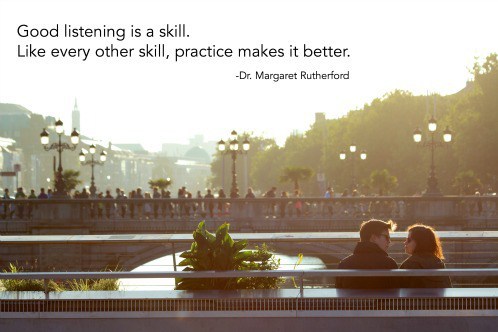True story.
Jim and Rebecca were attending a group workshop, where they were learning a specific technique of listening. One partner talked, one partner listened. The goal for the partner who was talking was to keep to one topic, and try to travel deeper into their feelings about it. The goal for the listening partner was to get their own agenda (ego) out of the way, and try to learn something they didn't know.
It's harder than you think, especially getting rid of your agenda when you're listening. Questions like, "What do you want me to do about that?", or "How do you think that affects me and the kids?" Not allowed.
It's more like asking questions the way you did when you were first dating -- when you couldn't wait to discover everything about this person sitting in front of you. How did he get the way he was? How did her mind work?
Everyone was taught the technique, and each couple practiced it, while others were listening and giving support afterwards.
One couple hadn't taken their turn. The husband says, "I'm ready. Let's go."
"No, I can't. I don't think I can say what I've been feeling. You won't understand."
"I promise, I can do it. I have watched others. I get this." The room settled in to listen.
"Okay." She took a long breath. "I often wish for your death."
The room became very still. A couple of long seconds went by.
He answered. "How long have you felt that way?"
They went on to have a discussion of how utterly hopeless she felt about their marriage. She had tried everything. Her fantasies about his death didn't mean she truly wanted him to die, but that she was incredibly demoralized and desperate.
He got it.
The next day, the couple came into the room, laughing. When asked what was the joke, Rebecca said, "We were walking on the sidewalk and Jim was on the street side. A huge tractor-trailor was about to come rolling past. He turned to me, with a wry smile on his face. "Now's your chance."
When couples walk in my door, saying, "We can't communicate," one of the things I immediately wonder is whether anyone is listening.
Good listening is a skill. Like every other skill, practice makes it better.
Why do we stop listening? There are many reasons, but here are a few.
1. It's easy to assume you know what you're partner is going to say.
After all, you've been together for years. And we can get repetitive with one another. But maybe, just maybe, you don't know what they're thinking.
What is that saying? "To assume is to make an ass out of u and me." You spend eight to 12 hours away from this person every day. They are having experiences that you're not aware of at all. Perhaps it would be interesting to stay curious about the life of your partner. 
2. You're thinking about what you're going to say, and can barely wait for them to stop talking.
As your partner is talking to you, you are busy formulating a response, a defense, something that will prove them wrong. You can't wait to make your point. It's a really bad habit.
If you stay in the moment, and respond more spontaneously, the conversation might actually lead somewhere fresh.
3. You're responding to their "tone", and stop listening to their words.
"As soon as she starts nagging, I shut her out."
"I hear that condescending tone in his voice, and I just get mad. Who is he to talk to me that way?"
We can grow very sensitive to how someone is talking to us and have an emotional reaction. We get mad, or withdraw. The message of what they're saying is lost on us. You can say to your partner, "I want to talk to you, but when you say it in the way you are, I tune out."
4. You're distracted by something else.
"I told you that."
"No, you didn't."
"Yes, I did. You were sitting, looking at the TV and doing something on your phone, but you answered me."
"Well, I don't remember that at all."
If you're really listening to someone, you're looking at them in the eyes, or jotting down what they're saying. It's an active activity. We get in the habit of trying to talk to each other, while distracted by a hundred other things. Wait until your partner is through doing something, before talking to them about something you want them to remember or understand completely.
5. You can misread your partner's motive, or intent.
You can believe that your partner has an ulterior motive behind what they're saying. Often, this occurs due to earlier conflict. You still think your partner is making a point, or getting a punch in. Let's say you had a fight about who is doing the brunt of the work around the house. Feelings were aired on both sides, but the subject is still sensitive.
Then, he says, "Do you want me to pick up the kids today?"
She explodes, "Just because I was saying I'm tired, doesn't mean I need you to do that!"
He has moved on, but she hasn't. She misreads his motivation or intent.
You can have "do-overs" for these kinds of conversations. Realize and admit that you're assuming negative intent. Then ask for another chance at talking.
Good communication is not impossible.
It takes attention, desire, and practice.
You can read more of Dr. Margaret on her website. Just click here!
Earlier on Huff/Post50:


